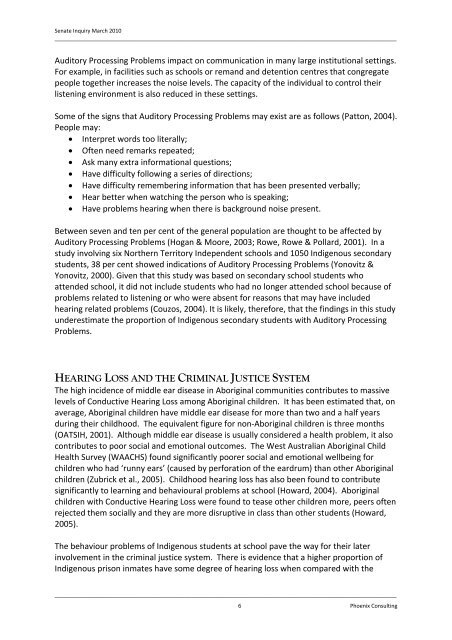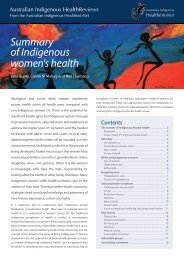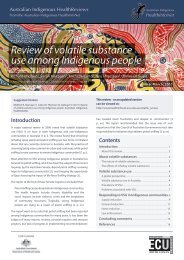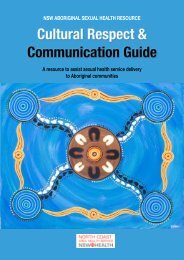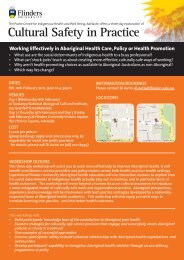hearing loss and the criminal justice system - Australian Indigenous ...
hearing loss and the criminal justice system - Australian Indigenous ...
hearing loss and the criminal justice system - Australian Indigenous ...
You also want an ePaper? Increase the reach of your titles
YUMPU automatically turns print PDFs into web optimized ePapers that Google loves.
Senate Inquiry March 2010_________________________________________________________________________________________________________________Auditory Processing Problems impact on communication in many large institutional settings.For example, in facilities such as schools or rem<strong>and</strong> <strong>and</strong> detention centres that congregatepeople toge<strong>the</strong>r increases <strong>the</strong> noise levels. The capacity of <strong>the</strong> individual to control <strong>the</strong>irlistening environment is also reduced in <strong>the</strong>se settings.Some of <strong>the</strong> signs that Auditory Processing Problems may exist are as follows (Patton, 2004).People may: Interpret words too literally; Often need remarks repeated; Ask many extra informational questions; Have difficulty following a series of directions; Have difficulty remembering information that has been presented verbally; Hear better when watching <strong>the</strong> person who is speaking; Have problems <strong>hearing</strong> when <strong>the</strong>re is background noise present.Between seven <strong>and</strong> ten per cent of <strong>the</strong> general population are thought to be affected byAuditory Processing Problems (Hogan & Moore, 2003; Rowe, Rowe & Pollard, 2001). In astudy involving six Nor<strong>the</strong>rn Territory Independent schools <strong>and</strong> 1050 <strong>Indigenous</strong> secondarystudents, 38 per cent showed indications of Auditory Processing Problems (Yonovitz &Yonovitz, 2000). Given that this study was based on secondary school students whoattended school, it did not include students who had no longer attended school because ofproblems related to listening or who were absent for reasons that may have included<strong>hearing</strong> related problems (Couzos, 2004). It is likely, <strong>the</strong>refore, that <strong>the</strong> findings in this studyunderestimate <strong>the</strong> proportion of <strong>Indigenous</strong> secondary students with Auditory ProcessingProblems.HEARING LOSS AND THE CRIMINAL JUSTICE SYSTEMThe high incidence of middle ear disease in Aboriginal communities contributes to massivelevels of Conductive Hearing Loss among Aboriginal children. It has been estimated that, onaverage, Aboriginal children have middle ear disease for more than two <strong>and</strong> a half yearsduring <strong>the</strong>ir childhood. The equivalent figure for non‐Aboriginal children is three months(OATSIH, 2001). Although middle ear disease is usually considered a health problem, it alsocontributes to poor social <strong>and</strong> emotional outcomes. The West <strong>Australian</strong> Aboriginal ChildHealth Survey (WAACHS) found significantly poorer social <strong>and</strong> emotional wellbeing forchildren who had ‘runny ears’ (caused by perforation of <strong>the</strong> eardrum) than o<strong>the</strong>r Aboriginalchildren (Zubrick et al., 2005). Childhood <strong>hearing</strong> <strong>loss</strong> has also been found to contributesignificantly to learning <strong>and</strong> behavioural problems at school (Howard, 2004). Aboriginalchildren with Conductive Hearing Loss were found to tease o<strong>the</strong>r children more, peers oftenrejected <strong>the</strong>m socially <strong>and</strong> <strong>the</strong>y are more disruptive in class than o<strong>the</strong>r students (Howard,2005).The behaviour problems of <strong>Indigenous</strong> students at school pave <strong>the</strong> way for <strong>the</strong>ir laterinvolvement in <strong>the</strong> <strong>criminal</strong> <strong>justice</strong> <strong>system</strong>. There is evidence that a higher proportion of<strong>Indigenous</strong> prison inmates have some degree of <strong>hearing</strong> <strong>loss</strong> when compared with <strong>the</strong>_________________________________________________________________________________________________________________6 Phoenix Consulting


